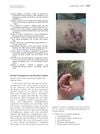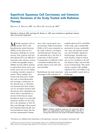
A 72-year-old man was diagnosed with a rare skin form of Rosai-Dorfman disease after years of misdiagnosis.
 May 2011 in “Journal of The American Academy of Dermatology”
May 2011 in “Journal of The American Academy of Dermatology” Objective assessment is needed to accurately determine medication use and adherence.

Accurate diagnosis of cicatricial alopecias requires thorough scalp examination and multiple biopsy techniques.
 January 2011 in “Springer eBooks”
January 2011 in “Springer eBooks” Eating a balanced diet with the right vitamins and minerals is important for healthy hair, but too many supplements can be harmful.
 January 2011 in “International Journal of Trichology”
January 2011 in “International Journal of Trichology” The document concludes that doctors should recognize congenital triangular alopecia to avoid unnecessary treatments, as it does not respond to steroids like alopecia areata does.
 December 2010 in “Dermatologic Surgery”
December 2010 in “Dermatologic Surgery” The letter discusses a disagreement about the definition of the "frontal area" in hair restoration surgery and questions the effectiveness of treatments like finasteride and minoxidil on this area.
 December 2010 in “Dermatologic Surgery”
December 2010 in “Dermatologic Surgery” Finasteride's effectiveness on the frontal hair loss area is not well-studied or confirmed.
 August 2010 in “Springer eBooks”
August 2010 in “Springer eBooks” Hormonal contraceptives are effective for teens but require careful consideration of side effects and individual health.
 January 2010 in “Nihon Hou Kagaku Gijutsu Gakkaishi”
January 2010 in “Nihon Hou Kagaku Gijutsu Gakkaishi” The modified staining method can determine the ABO blood group of hair samples accurately.
 April 2009 in “Contemporary Psychoanalysis”
April 2009 in “Contemporary Psychoanalysis” Analysts should confront their biases and self-interests to improve therapy.
 November 2008 in “Medical Hypotheses”
November 2008 in “Medical Hypotheses” The conclusion suggests a new treatment for infantile hemangiomas and a potential target for hair loss treatment.
 June 2007 in “Men in Nursing”
June 2007 in “Men in Nursing” The document emphasizes early detection and treatment of men's skin conditions and recommends protective measures and appropriate treatments for different age groups.
 November 2006 in “Dermatologic Surgery”
November 2006 in “Dermatologic Surgery” Cutting hair follicles into pieces for transplantation results in poor growth and thinner hair, and the technique is more invasive than previously thought.
 May 2006 in “Dermatologic Surgery”
May 2006 in “Dermatologic Surgery” Radiation therapy successfully treated an elderly man's skin cancer and pre-cancerous scalp lesions.
 November 2005 in “Journal of Investigative Dermatology Symposium Proceedings”
November 2005 in “Journal of Investigative Dermatology Symposium Proceedings” The 2004 hair research meeting presented new findings on hair cell differentiation, genetic factors in hair loss, hair pigmentation, and potential targeted therapies.
 August 2005 in “Microscopy and Microanalysis”
August 2005 in “Microscopy and Microanalysis” Polymethylene wax in hair relaxers makes hair smooth and shiny with less damage.
 July 2005 in “Journal of The American Academy of Dermatology”
July 2005 in “Journal of The American Academy of Dermatology” Using a cotton-tipped applicator as a base for cutting sutures helps make them a uniform length and reduces the risk of skin cuts.
 January 2004 in “Side effects of drugs annual”
January 2004 in “Side effects of drugs annual” Certain skin drugs and topical agents, including some natural extracts and fragrances, can cause allergic reactions. Some hair dyes and extensions, as well as minoxidil, a hair growth treatment, can also cause allergies. Botulinum toxin A can effectively reduce sweat but may have temporary side effects.
 July 2003 in “Journal of Cutaneous Medicine and Surgery”
July 2003 in “Journal of Cutaneous Medicine and Surgery” Blood pressure drugs can cause skin lupus, but it improves after stopping the drug. The glycoprotein D vaccine works against genital herpes in some women, and the HPV-16 vaccine reduces HPV-16 infection and related diseases. More frequent light therapy clears psoriasis faster. A cream called imiquimod effectively treats a type of skin cancer. Iron supplements don't necessarily help with chronic hair loss in women.
 July 2003 in “Journal of Cutaneous Medicine and Surgery”
July 2003 in “Journal of Cutaneous Medicine and Surgery” Various skin conditions like cutaneous lupus erythematosus, psoriasis, and basal cell carcinoma can be effectively treated with antihypertensive agents, NB-UVB phototherapy, and imiquimod cream respectively. Vaccines are effective against genital herpes and HPV-16 infection. Early intervention is crucial for conditions like diabetic foot ulcers and neonatal herpes. Certain dyes can cause hand dermatitis, and there's a link between smoking/drinking and psoriasis in men. No direct link was found between low iron levels and chronic hair loss in women.
 July 2003 in “Journal of Cutaneous Medicine and Surgery”
July 2003 in “Journal of Cutaneous Medicine and Surgery” Some medications can improve skin conditions, while lifestyle factors like smoking and drinking may worsen them; treatments like monoclonal antibodies and imiquimod cream show promise for certain skin diseases.
 July 2003 in “Journal of Cutaneous Medicine and Surgery”
July 2003 in “Journal of Cutaneous Medicine and Surgery” High blood pressure drugs often cause skin lupus, stopping the drug usually helps. A vaccine helps prevent genital herpes and HPV-16. More frequent light therapy clears psoriasis faster. No link was found between low iron and chronic hair loss.
 July 2003 in “Journal of Cutaneous Medicine and Surgery”
July 2003 in “Journal of Cutaneous Medicine and Surgery” Treating psoriasis with UVB light three times a week is faster than twice a week, and certain medications and lifestyle factors affect psoriasis treatment outcomes.
 July 2003 in “Journal of Cutaneous Medicine and Surgery”
July 2003 in “Journal of Cutaneous Medicine and Surgery” Certain drugs can cause skin lupus, but stopping the drug usually helps. Vaccines work against smallpox, genital herpes, and a type of human papillomavirus. More frequent light therapy clears psoriasis faster. Certain treatments work for psoriasis and dermatitis. A specific cream effectively treats a type of skin cancer. Low iron levels aren't directly linked to chronic hair loss.
 July 2003 in “Journal of Cutaneous Medicine and Surgery”
July 2003 in “Journal of Cutaneous Medicine and Surgery” Certain drugs can cause lupus, stopping these drugs is the main treatment. NB-UVB phototherapy clears psoriasis faster when applied three times a week. Monoclonal antibodies and oral pimecrolimus are effective in treating psoriasis. Smoking and drinking are linked to psoriasis in men. No direct link between low iron and hair loss was found. Vaccines are effective against genital herpes and human papillomavirus type 16.
 July 2003 in “Journal of Cutaneous Medicine and Surgery”
July 2003 in “Journal of Cutaneous Medicine and Surgery” Blood pressure drugs can cause skin lupus, early treatment is key for baby herpes and diabetic foot ulcers, a certain vaccine works against genital herpes and HPV in women, more frequent light therapy helps psoriasis, smoking and drinking can worsen psoriasis, a cream clears up a type of skin cancer, and low iron levels don't cause chronic hair loss.
 July 2003 in “Journal of Cutaneous Medicine and Surgery”
July 2003 in “Journal of Cutaneous Medicine and Surgery” Various skin conditions can be treated effectively with different methods, such as discontinuing certain drugs, using specific vaccines, applying creams, and changing lifestyle habits like smoking and drinking.
 July 2003 in “Journal of Cutaneous Medicine and Surgery”
July 2003 in “Journal of Cutaneous Medicine and Surgery” Skin problems are common in Bangladesh due to arsenic, prompt treatment of diabetic foot ulcers is crucial, maternal transmission causes most neonatal herpes, treatments for pediatric vasculitis are effective, the chickenpox vaccine works, more frequent UVB therapy helps psoriasis, certain jobs increase hand dermatitis risk, monoclonal antibodies treat psoriasis well, lifestyle affects psoriasis, alefacept improves psoriasis, imiquimod cream partially clears basal cell carcinoma, and iron may not help chronic hair loss.
 July 2003 in “Journal of Cutaneous Medicine and Surgery”
July 2003 in “Journal of Cutaneous Medicine and Surgery” The document concludes that various treatments for skin conditions are effective, but some require further research, and certain factors like gender and lifestyle can influence disease outcomes.
 July 2003 in “Journal of Cutaneous Medicine and Surgery”
July 2003 in “Journal of Cutaneous Medicine and Surgery” Stopping certain drugs can improve skin conditions, arsenicosis affects over half of a Bangladeshi village, males are more vulnerable, and certain treatments are effective for warts, acne, and psoriasis. Smoking and drinking are linked to psoriasis in men, a cream helps with a type of skin cancer, and low iron levels don't directly cause chronic hair loss in women.






























